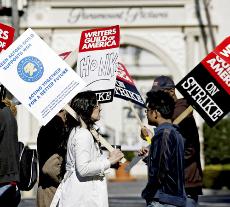Writers look at deal to end strike

Writers guild members picket outside Paramount Studios in Los Angeles, in this Feb 4. 2008, file photo. The 3-month Hollywood writers strike could enter its final chapter Saturday, Feb. 9, when guild members gather in Los Angeles and New York to consider Nick Ut, The Associated Press
Feb 8, 2008
LOS ANGELES – Hollywood writers got their first look Saturday at details of a tentative agreement with studios that could put the strike-crippled entertainment industry back to work, an offer the union’s East Coast president said Saturday he would endorse.
A summary of the proposed deal crafted this week was posted on the Writers Guild of America’s Web site hours before members were to attend meetings on the East and West coasts to voice their opinions.
The writers gathered behind closed doors Saturday afternoon in New York and were meeting later in Los Angeles to consider the deal that guild leaders said “protects a future in which the Internet becomes the primary means of both content creation and delivery.”
Compensation for projects delivered via digital media was the central issue in the 3-month-old walkout, which idled thousands of workers, disrupted the TV season and moviemaking and took the shine off Hollywood’s awards season.
“I believe it is a good deal. I am going to be recommending this deal to our membership,” Michael Winship, president of the Writers Guild of America, East, told reporters before the New York meeting at a Times Square hotel.
Get The Daily Illini in your inbox!
If guild members react favorably to the proposed deal, the guild’s board could vote Sunday to lift the strike order and the industry could be up and running Monday. This month’s Oscars ceremony, which has been under the cloud of a union and actors boycott, also would be a winner.
Sunday’s Grammy Awards ceremony has a picket-free pass from the union.
Members weren’t expected to formally vote on the contract at Saturday’s meetings, which the guild called to get their perspective before moving ahead.
“The survival of our union is at stake” with this contract, writer Bob Mittenthal said as he entered the meeting. “Entertainment is migrating to the Internet, and if that’s not covered by the contract there’s no reason for the union to exist.”
He said the deal may not give writers all they wanted, but added, “it’s something. We’ve made inroads.”
Winship cautioned that it’s not a “done deal” until the contract is ratified by members. He also said that several steps must be taken before the West guild’s board and East guild’s council decide to lift the strike order.
“It conceivably could be Monday, but there are several different alternative ways that the board and council could determine how this should be dealt with,” Winship said.
An outline of the three-year deal was reached in recent talks between media executives and the guild, with lawyers then drafting the contract language that was concluded Friday.
According to the guild’s summary, the deal provides union jurisdiction over projects created for the Internet based on certain guidelines, sets compensation for streamed, ad-supported programs and increases residuals for downloaded movies and TV programs.
The writers deal is similar to one reached last month by the Directors Guild of America, including a provision that compensation for ad-supported streaming doesn’t kick in until after a window of between 17 to 24 days deemed “promotional” by the studios.
Writers would get a maximum $1,200 flat fee for streamed programs in the deal’s first two years and then get a percentage of a distributor’s gross in year three – the last point an improvement on the directors deal, which remains at the flat payment rate.
“Much has been achieved, and while this agreement is neither perfect nor perhaps all that we deserve for the countless hours of hard work and sacrifice, our strike has been a success,” guild leaders Winship and Patric Verrone, head of the Writers Guild of America, West, said in an e-mailed message to members.
Together, the guilds represent 12,000 writers, with about 10,000 of those involved in the strike. Studios are represented by Alliance of Motion Picture and Television Producers.
One observer said the guild gained ground in the deal but not as much as it wanted.
“It’s a mixed deal but far better than the writers would have been able to get three months ago. The strike was a qualified success,” said Jonathan Handel, an entertainment attorney with the TroyGould firm and a former associate counsel for the writers guild.
The walkout “paved the way for the directors to get a better deal than they would otherwise have gotten. That in turn became the foundation for further improvements the writers achieved,” Handel said.
Associated Press writer Verena Dobnik in New York contributed to this report.





